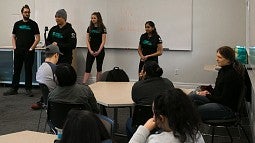Making the transition to college isn’t as simple as finding classrooms or learning to throw your O, and that’s exactly why the UO’s College of Education has a class that not only introduces students to college life but also adulthood.
Formally known as Counseling Psychology 217, it also goes by the somewhat more informative title Foundations of Student Health and Well-Being. The class provides undergraduate students the tools and knowledge to navigate the sometimes-frenetic pace of young adulthood.

Open to all undergraduates, but recommended especially for first- or second-year students, the pass/no pass class covers many hot-button topics for emerging adults. Among them: time management, sleep and nutrition, sexuality, alcohol and drug use, budgeting, civic engagement and more.
With so much popular attention focused on sex and drugs, it may be surprising that the class segments on sleep and stress management are what really get students talking. As one current student said in a midterm evaluation, “So after learning about that (sleep effects) I actually decided to change my sleeping habits and found out that I was much more awake. Not only my body felt this way but also my brain.”
Esmeralda Rodriguez completed the winter term class. A first-generation college student, Rodriguez said the class exceeded her expectations.
“I thought that I would benefit from this class a lot because I’m a freshmen and this is my first time away from home,” she said. “I have learned from every topic that has been talked about. The main thing I took from all of these topics is that there are resources (on campus) to talk to people and get help and that we aren’t alone.”
Another student discussed recommending the class to others, “… It really is beneficial, and this is a class where I feel you could keep using the information even after you graduate.”
Katie Harbert, an assistant athletic director, developed the three-credit class with Sara Rabinovitch, a counseling psychology doctoral candidate, and Ellen Hawley McWhirter, the Ann Swindells Professor in Counseling Psychology.
The class was developed in 2014 and 2015. Harbert teaches the class fall term, with winter and spring classes taught by graduate students Jess Farrar and Amala Shetty. Additional sections are added to meet demand.
“We like to keep the class size below 40 students,” McWhirter said. “Our ultimate goal is for the class to be taken by the majority of first-year students. We will increase the number of sections as demand rises.”
The university’s athletic department strongly recommends all student athletes take the class during their first term on campus. McWhirter is quick to point out that the class is academically robust and said a cross-disciplinary work group carefully reviewed all materials before they were adopted.
The university’s undergraduate curriculum committee also approved the class before the proposal was sent to College of Education Dean Randy Kamphaus for final approval
Although hosted in the College of Education, the class is open to students across campus.
“The CPSY 217 course establishes a great foundation of student health and well-being in a way that bridges theory to life-application,” said Kerry Frazee, director of sexual violence prevention and education in the Office of the Dean of Students. “I appreciate that this curriculum is informed by research and educates on the latest best practices for direct integration into the students’ lives.”
Contact Shetty at ashetty@uoregon.edu or McWhirter at ellenmcw@uoregon.edu for more information about the class.
—By Jeff Bolkan, College of Education


